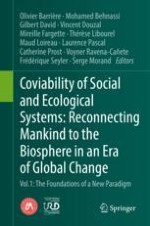2019 | OriginalPaper | Buchkapitel
23. Approaching the Human-Environment Nexus Beyond Conflict: A Peace and Coviability Perspective
verfasst von : Mohamed Behnassi
Erschienen in: Coviability of Social and Ecological Systems: Reconnecting Mankind to the Biosphere in an Era of Global Change
Aktivieren Sie unsere intelligente Suche, um passende Fachinhalte oder Patente zu finden.
Wählen Sie Textabschnitte aus um mit Künstlicher Intelligenz passenden Patente zu finden. powered by
Markieren Sie Textabschnitte, um KI-gestützt weitere passende Inhalte zu finden. powered by
